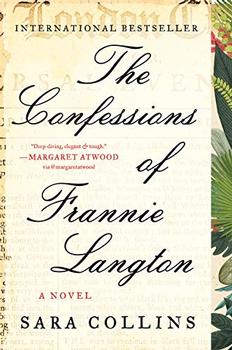Page 1 of 1
There are currently 2 reader reviews for The Confessions of Frannie Langton
Write your own review!
 Cathryn Conroy
It's a Page Turner! Literary Historical Fiction Wrapped Around a Sensational Murder Mystery
Cathryn Conroy
It's a Page Turner! Literary Historical Fiction Wrapped Around a Sensational Murder Mystery
This literary historical novel has just about everything to keep the pages turning. At the heart of this book by Sara Collins is a sensational murder mystery swathed in betrayal, jealousy, forbidden sex, drug addiction, the evils of slavery, and the privilege and entitlement of the British upper class.
The book opens in April 1826 with Frannie Langton imprisoned in the notorious Newgate Prison in London, awaiting trial at the Old Bailey Criminal Court for the double murder of her employers, George and Marguerite Benham. They were discovered one night stabbed to death in their London home. He was in his library. She was in her bed. And lying next to Marguerite sound asleep and covered in her mistress's blood was Frannie, who quickly became dubbed by the broadsheets as The Mulatta Murderess. Frannie has no memory of what happened, so she sits in prison writing her life story to her attorney.
But back up a bit. After this prologue, the novel switches to 1812 on a sugar cane plantation in Jamaica that is owned by John Langton and powered with the muscle and sweat of slaves. One of those slaves is Frannie, a house girl whose father is the master, and who teaches her to read and write as an experiment to see how much Blacks can learn. Meanwhile, Langton and a crony are up to no good in the estate's old coach-house, and they drag Frannie into their devious and sadistic experiments to "prove" the differences between the races. After a devastating fire, Langton and Frannie flee to London where he gives Frannie to George Benham in exchange for what he hopes will be assistance publishing his lifelong research. Benham is also working on the same type of dubious and horrifying research. England has outlawed slavery, so Frannie is supposedly free, although where else could she go? Benham threatens her with a destitute life on the streets if she doesn't tell him everything Langton was doing, while Marguerite chooses Frannie as her personal lady's maid. But there is more than dressing and cleaning going on in this room, as the two discover a forbidden love that thrills them both. And then one day, it all comes to an abrupt and cruel end…until Benham makes a request of Frannie that is despicable and shocking. Hours later, the Benhams are dead.
Who is the murderer? That revelation gave me the shivers!
This literary novel is also wrapped around two classics, "Moll Flanders" by Daniel Defoe and "Candide," by Voltaire. Plot points and imagery from both are woven throughout this imaginative, gritty, and compelling story of how the upper classes oppress and subjugate the lower classes, especially those of color.
Frannie may have no power, no status, no wealth, and nothing to call her own, but she has a powerful and impressive voice that no one can silence and that is what illuminates this book.
 Sandi W.
The slave's confession...
Sandi W.
The slave's confession...
Through the written confession of a slave, a maid, we find out whether or not she committed the murder that she is being tried and convicted of. Frannie Langton has been accused of killing the woman she loves - a wealthy woman whose illness puts her in frail state. Not to mention her addiction to opiates.
Educated by her Jamaican 'Massa' so that she could help with his experiments on his slave population, he then 'gifted' her to his London scientific-writing partner in crime. Once she became her Mistresses personal maid she saw the disparity between her and the Mister and took her mistresses side in all accounts, only to find this action would hurt her in the near future.
When arrested for the murders of her new owners, Frannie is not sure. She is also now a opiate addict, thanks to her Mistress, and cannot remember what actually happened. The final account of her life she writes as her trial takes place.
Collins did a good job not only on character development but on the way she presented the story. Chapters are interspersed between Frannie's final letter and her murder trial. It is only in the last pages that Collins brings the story together. With this type of work as a debut, this author will be one to watch.
